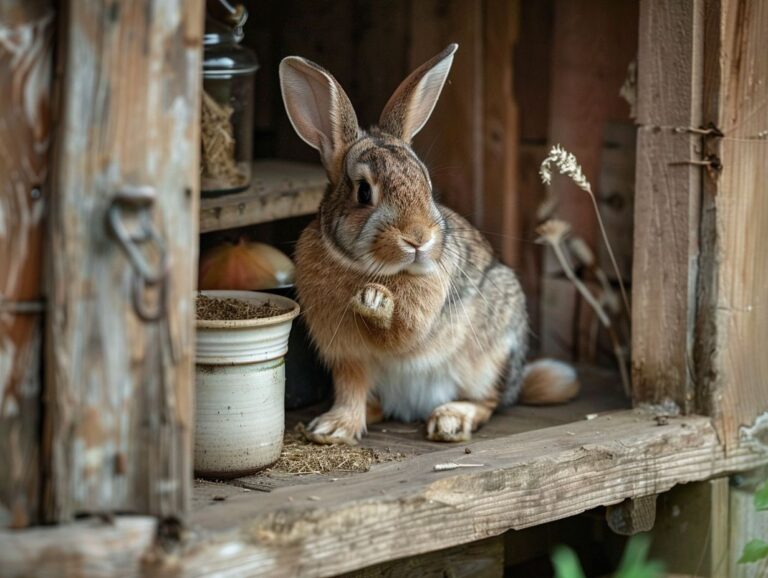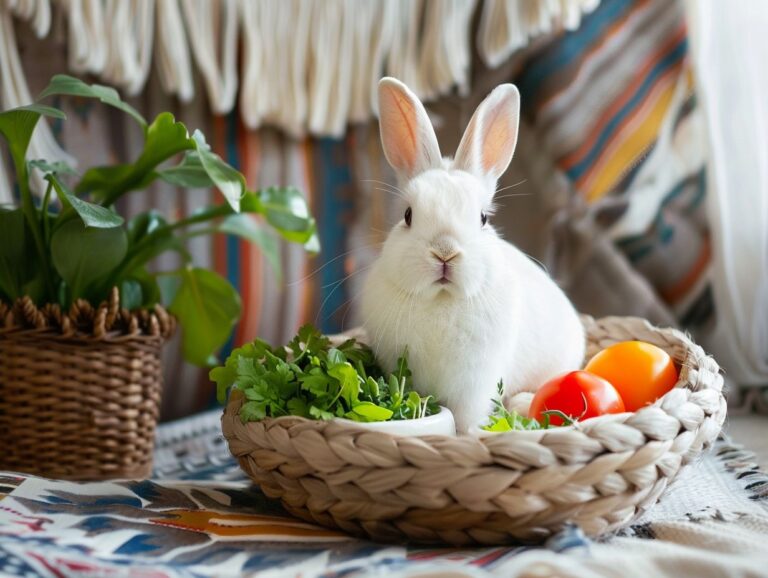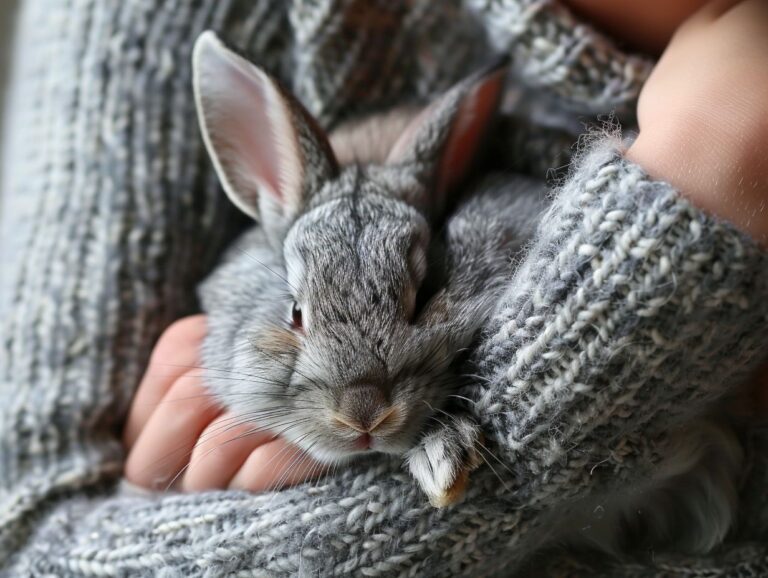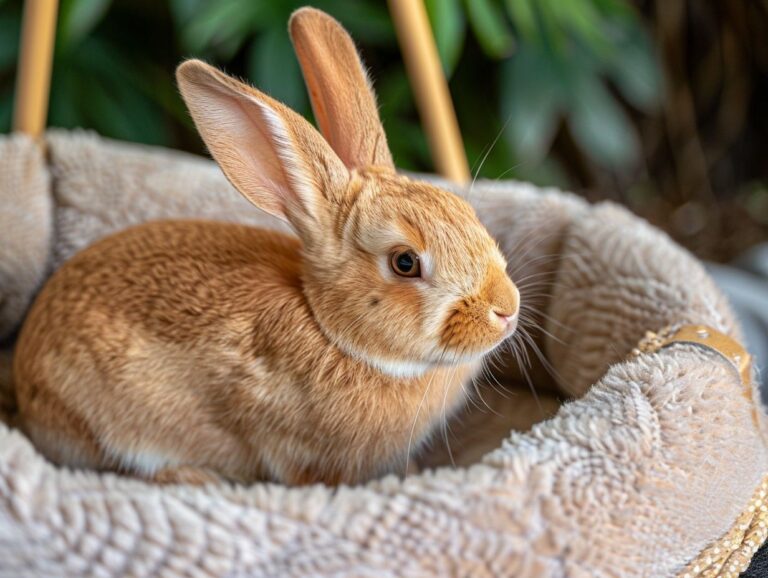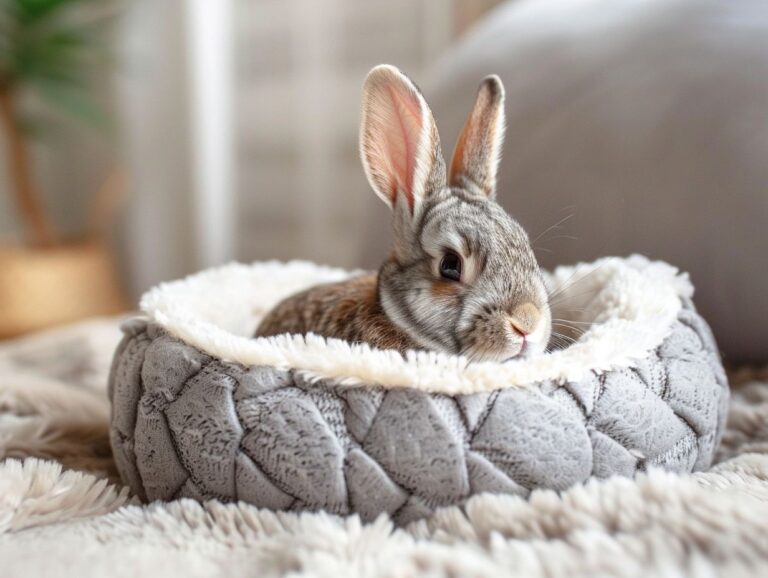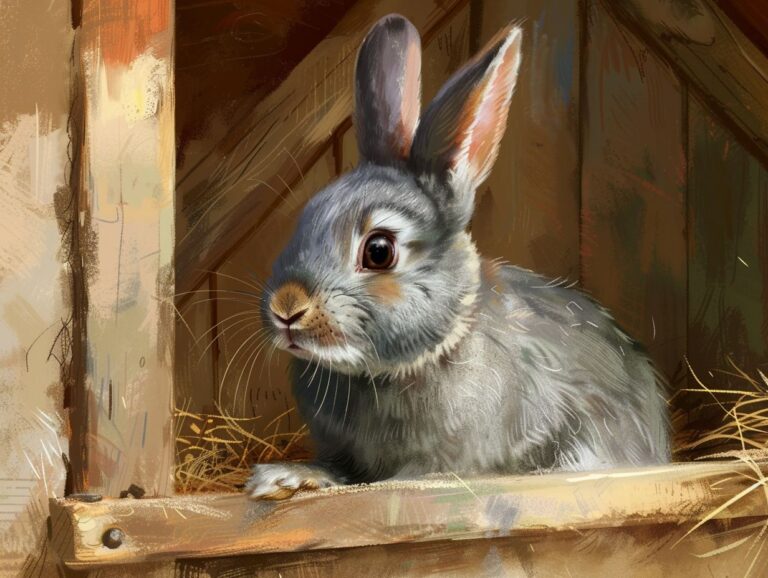Mini Lop Rabbits As Pets: Care, Diet, and Health For Small Breeds
Are you considering getting a Mini Lop rabbit as a pet but not sure what to expect?
In this article, we will explore the characteristics of Mini Lop rabbits, including their size, coat, temperament, and lifespan.
We will also discuss the requirements for caring for these small breeds, such as housing, diet, exercise, and grooming.
Learn everything you need to know about these adorable furry companions and get tips on how to keep Mini Lop rabbits healthy.
Key Takeaways:
What Are Mini Lop Rabbits?
Mini Lop rabbits are a small-sized breed known for their cute appearance and friendly demeanor. They are popular as pets due to their compact size and gentle nature, making them great companions for individuals and families alike.
These adorable rabbits originated in Germany during the 1970s as a result of crossing small lop-eared rabbits with Mini Lop rabbits, also sometimes referred to as Holland Lops.
Over time, their charming personalities and easy-going nature have captured the hearts of many, propelling them to be one of the most sought-after pet care rabbits in the world.
Their endearing floppy ears and short, dense fur make them not only visually appealing but also quite easy to care for, requiring regular grooming to keep their coat in good condition.
What Are The Characteristics Of Mini Lop Rabbits?
Mini Lop rabbits exhibit distinctive characteristics that set them apart from other rabbit breeds. These include their small size, plush coat, friendly temperament, and relatively long lifespan, making them a popular choice among rabbit enthusiasts.
Mini Lop rabbits are known for their compact size, with adults typically weighing between 4 to 6 pounds. Their plush coat is soft and dense, requiring regular grooming to prevent matting. In terms of temperament, Mini Lops are gentle and social creatures, often forming strong bonds with their owners. With proper care and a balanced rabbit diet, they can live up to 10-12 years, providing long-lasting companionship to those who welcome them into their homes.
Size
Mini Lop rabbits typically fall within the range of 2 to 6 pounds, making them one of the smaller rabbit breeds in the rabbit world. Their petite size contributes to their charm and appeal as pets.
Due to their compact size, Mini Lops are well-suited for indoor living, requiring less space compared to larger rabbit breeds. This makes them ideal for individuals living in apartments or houses with limited room. Their diminutive stature also influences how they interact with humans, as they are often seen as more manageable and approachable pets, especially for children who may be intimidated by larger animals. Despite their small size, Mini Lops are known for their outgoing personalities and affectionate nature, forming strong bonds with their human companions.
Coat
Mini Lop rabbits boast a soft and dense coat that requires regular grooming to maintain its quality and prevent matting. Their fur comes in various colors and patterns, adding to their visual appeal.
When grooming Mini Lop rabbits, it’s essential to brush their coat at least once a week to remove loose hair and prevent tangles. Pay special attention to the areas behind the ears and under the belly where matting is common. Mini Lops showcase a wide range of coat colors including agouti, solid, broken, and shaded, ranging from chocolate, blue, and lilac to tortoiseshell and chinchilla. These delightful rabbits also exhibit different patterns such as magpie, butterfly, and charlie, adding a unique flair to their overall appearance.
Temperament
Mini Lop rabbits are known for their friendly and sociable nature. They enjoy human interaction and are often docile and affectionate towards their owners, making them ideal companions for individuals seeking a cuddly pet.
These rabbits have a gentle demeanor and thrive on companionship, forming strong bonds with their human family members. Their social behavior makes them a popular choice for households with children or other pets, as they are typically tolerant and engaging.
Mini Lops are known to seek out attention and affection from their owners, often nudging them for pets and cuddles. Their playful and curious nature adds a delightful charm to their already endearing personality, making them a joy to have around.
Lifespan
Mini Lop rabbits have a relatively long lifespan compared to other small rabbit breeds, with an average life expectancy ranging from 7 to 14 years when provided with proper care and a healthy environment.
Factors influencing the longevity of Mini Lop rabbits include genetics, diet, exercise, and overall well-being. Ensuring a balanced diet rich in hay, vegetables, and limited pellets, along with regular exercise, can significantly contribute to their health and lifespan. Like all rabbit breeds, Mini Lops are prone to certain health issues such as dental problems, obesity, and gastrointestinal stasis. Regular veterinary check-ups, dental care, and a clean living environment can help mitigate these risks and ensure a happy and fulfilling life for these adorable pets.
What Are The Requirements For Caring For Mini Lop Rabbits?
Caring for Mini Lop rabbits involves providing appropriate housing, a balanced diet, regular exercise, and grooming to ensure their health and well-being. Attention to these aspects is crucial for fostering a happy and contented rabbit.
Regarding housing, Mini Lop rabbits thrive in spacious enclosures that allow them to move around freely. It’s important to choose a cage or hutch that provides ample space for your rabbit to hop, stretch, and stand up on its hind legs without restrictions. Lining the enclosure with Carefresh bedding ensures a comfortable and clean living environment for your furry friend.
In terms of diet, a proper rabbit diet is essential for their overall health. A diet rich in hay, fresh vegetables, and pellets specially formulated for rabbits is ideal. Make sure to provide a constant supply of fresh water to keep your rabbit hydrated and healthy. For medium-sized rabbit breeds, like the Belgian Hares, specific care, diet, and health considerations must be taken into account.
Regular exercise is vital to prevent obesity and promote physical and mental well-being for Mini Lop rabbits. Allowing your rabbit daily playtime outside the enclosure, under supervision, will help them stay active and happy. Check out this guide on care, diet, and health for small breeds for more information.
Grooming your Mini Lop rabbit regularly is necessary to prevent matting and keep their fur clean and healthy. Brushing their fur gently and checking their nails and teeth are important parts of a proper grooming routine for your rabbit.
Housing
Mini Lop rabbits should be housed in a spacious and secure enclosure that provides ample room for movement and exploration. Using bedding materials like Carefresh can help maintain a clean and comfortable living environment for these rabbits.
When setting up the enclosure for your Mini Lop rabbits, consider the dimensions to ensure they have sufficient space to hop around and exercise. It’s crucial to prioritize security by selecting a sturdy enclosure with no sharp edges or small openings that could pose a danger to the rabbits.
Bedding plays a significant role in the overall well-being of Mini Lop rabbits. Carefresh bedding, known for its absorbency and odor control, is an excellent choice as it helps keep the enclosure clean and dry, reducing the risk of bacterial growth and potential health issues for your furry companions.
Diet
A well-rounded diet is essential for Mini Lop rabbits to thrive. This includes a combination of high-quality pellets, fresh hay like British Meadow Feeding Hay, and a variety of fresh vegetables to ensure their nutritional needs are met.
Mini Lop rabbits, like other breeds, require a specific balance of proteins, fibers, vitamins, and minerals to support their growth and overall health. The pellets should make up the bulk of their diet, with options like Burgess Excel being a popular choice among rabbit owners due to its balanced formula. Hay is important for their digestive health and dental wear, so providing them with a constant supply of high-quality hay is crucial.
Fresh vegetables such as leafy greens, carrots, and bell peppers should be incorporated into their daily meals to offer variety and additional nutrients. It’s important to introduce new foods gradually and monitor their response to ensure they don’t have any adverse reactions.
Exercise
Regular exercise is crucial for Mini Lop rabbits to maintain their physical health and mental well-being.
Mini Lop rabbits are known for their playful and curious nature, making it essential to provide them with sufficient exercise opportunities to satisfy their active instincts. Engaging in activities such as hopping, digging, and running not only benefits their physical health but also stimulates their mental agility.
Physical activity helps Mini Lops stay fit, preventing various health issues like muscle weakness and digestive problems. Incorporating toys, tunnels, and safe outdoor play areas in their environment can encourage them to stay active and entertained.
Grooming
Grooming is an essential aspect of Mini Lop rabbit care to maintain their coat health and hygiene. Regular brushing, nail trimming, and ear cleaning are necessary grooming practices to keep these rabbits looking and feeling their best.
Mini Lop rabbits, known for their luxurious and soft fur, require regular grooming to prevent matting and tangling. Coat care includes gentle brushing at least once a week to remove loose fur and prevent hairballs. Trimming their nails is vital to avoid overgrowth that can lead to discomfort and mobility issues.
- Nail trimming: Trim the nails every 4-6 weeks to ensure they do not become too long. Use a small animal nail clipper and be cautious not to cut the quick.
- Ear hygiene: Regularly check their ears for dirt or mites. Clean the outer ear with a damp cloth, avoiding inserting anything into the ear canal.
What Are The Common Health Problems Of Mini Lop Rabbits?
Mini Lop rabbits are prone to several common health problems, including dental issues and ear infections. Early detection and prompt veterinary care are essential in managing these conditions effectively.
Gastrointestinal stasis is another major health concern that Mini Lop rabbits may face. This condition, characterized by reduced gut motility, can lead to serious complications if left untreated. Ensuring a proper diet high in fiber, plenty of water, and regular exercise can help prevent gastrointestinal issues. Regarding rabbit care, monitoring their dental health, cleaning their ears regularly to prevent infections, and observing their digestion patterns are crucial steps to maintaining the overall well-being of these adorable pets.
Dental Issues
Dental issues, such as overgrown teeth and malocclusion, are common concerns in Mini Lop rabbits due to their unique dental structure. Regular dental check-ups and appropriate chew toys can help prevent and address these problems.
Mini Lop rabbits are prone to dental issues due to the nature of their continuously growing teeth. When these teeth become overgrown, it can lead to pain, difficulty eating, and even abscesses. Malocclusion, a condition where the teeth do not align properly, is also prevalent in this breed.
Common symptoms of dental issues in Mini Lops include drooling, reduced appetite, weight loss, and even changes in behavior. If left untreated, these problems can escalate and impact the overall health of the Polish rabbits as pets.
To prevent dental issues, it is crucial to provide a diet rich in fiber and encourage gnawing on safe chew toys. Regular veterinary check-ups are essential to catch any dental problems early and prevent complications.”
Ear Infections
Ear infections are another common health issue that Mini Lop rabbits may experience, often due to bacterial or fungal infections. Regular ear checks, proper hygiene, and veterinary treatment are essential for managing and preventing ear problems in these rabbits.
Signs of an ear infection in Mini Lops can vary, including head shaking, ear scratching, redness or swelling of the ear canal, and a foul odor. These infections are typically caused by bacteria or yeast that thrive in warm, moist environments, making the floppy ears of Mini Lops particularly susceptible. It is crucial to address any ear issues promptly to prevent secondary complications like inner ear infections or abscesses.
Gastrointestinal Stasis
Gastrointestinal stasis, characterized by a slowdown in gut motility, can pose a serious health risk to Mini Lop rabbits. Providing a high-fiber diet, adequate hydration, and prompt veterinary attention are crucial in managing this condition.
Common symptoms of gastrointestinal stasis in Mini Lop rabbits include reduced appetite, decreased fecal output, abdominal discomfort, and lethargy. Causes of this condition can range from inadequate fiber intake, stress, dental issues, to lack of exercise. It’s essential to address these underlying factors while offering gentle massages and encouraging movement to aid digestion.
When managing gastrointestinal stasis, ensuring the rabbit’s diet includes a variety of hay, leafy greens, and limited pellets is essential. Hydration is key, so providing fresh water around the clock and offering water-rich vegetables can help prevent dehydration, a common complication. For more information on caring for medium-sized breeds like Rhinelander rabbits, check out this guide on Rhinelander rabbits care.
Seeking veterinary care promptly is recommended if the rabbit shows signs of gastrointestinal stasis. Veterinarians may recommend fluid therapy, pain management, critical care feeding, and other interventions to support the rabbit’s recovery. Regular health check-ups and a rabbit-safe environment can also contribute to preventing such issues.”
How To Keep Mini Lop Rabbits Healthy?
Ensuring the health and well-being of Mini Lop rabbits requires a holistic approach that includes regular vet check-ups, a balanced diet like Burgess Excel, a clean living environment, ample exercise, and opportunities for bonding and socialization.
Regular veterinary check-ups are crucial to detect any health issues early on and ensure preventive care. Burgess Excel provides a well-balanced diet rich in essential nutrients for your Mini Lop, promoting overall health and vitality. Keeping their living environment clean and well-maintained helps prevent diseases and promotes a stress-free atmosphere. Engaging your rabbit in regular exercise, such as supervised playtime and access to space for hopping and running, is essential for their physical and mental well-being. Providing opportunities for social interaction and bonding through gentle handling and companionship with other rabbits promotes their emotional health and reduces stress.
Regular Vet Check-Ups
Scheduling regular veterinary check-ups is crucial in monitoring the overall health and well-being of Mini Lop rabbits. A qualified rabbit-savvy vet can assess their condition, provide preventive care, and address any health concerns promptly.
Proactive healthcare through regular vet visits is essential to ensure that your furry friend remains happy and healthy. During these check-ups, the vet can conduct thorough examinations to detect any potential health issues early on.
Preventive measures such as vaccinations, parasite control, and dental care are crucial to safeguard your Himalayan rabbits as pets against common health problems.
Timely intervention and treatment can make a significant difference in the overall well-being and longevity of your beloved rabbit companion.
Proper Diet and Nutrition
Maintaining a balanced diet and providing proper nutrition are essential components of keeping Mini Lop rabbits healthy and thriving. A diet rich in hay, fresh vegetables, and quality pellets can support their growth and well-being.
Hay is a crucial element in a Mini Lop rabbit’s diet, providing essential fiber for digestion and dental health. Fresh vegetables offer a variety of nutrients, with leafy greens like kale and spinach being particularly beneficial. Quality pellets specially formulated for rabbits help meet their specific nutritional needs, dutch rabbit care tips.
Proper nutrition plays a significant role in preventing health issues such as obesity and dental problems in Mini Lop rabbits. By ensuring a well-rounded diet, owners can promote optimal health and longevity for their beloved pets.
Clean Living Environment
Maintaining a clean and hygienic living environment is vital for the health and comfort of Mini Lop rabbits. Regular cage cleaning, proper bedding, and good ventilation can help prevent health issues and promote a safe habitat for these pets.
Mini Lop rabbits are known for their playful and sociable nature, making it essential to ensure their living space is conducive to their well-being. Dirty cages can lead to bacterial growth, respiratory problems, and infections in rabbits. By regularly cleaning their living area, removing soiled bedding, and disinfecting their habitat, you can safeguard them from potential health risks.
Proper bedding choices, such as hay or straw, provide comfort and insulation for rabbits, preventing sore hocks and other skin issues. Maintaining a balance between absorbent bedding materials and proper ventilation helps regulate humidity levels, reducing the risk of mold growth and respiratory issues.
Exercise and Mental Stimulation
Providing ample opportunities for exercise and mental stimulation is crucial for the overall well-being of Mini Lop rabbits. Engaging in playtime, offering toys, and creating a stimulating environment can prevent boredom and promote their physical and mental health.
Exercise is key to maintaining a healthy weight and preventing obesity in Mini Lop rabbits, a common issue in indoor pets. By allowing them to hop, run, and explore, you not only keep their bodies fit but also provide mental enrichment. Physical activity also supports good digestion and prevents musculoskeletal problems. To make playtime more engaging, consider setting up obstacle courses, providing tunnels, or introducing interactive toys that encourage natural behaviors.
Bonding and Socialization
Building a strong bond and fostering socialization opportunities are key aspects of caring for Mini Lop rabbits.
Interacting with Mini Lop rabbits not only strengthens your relationship with them but also plays a vital role in their emotional development. Engaging in activities such as gentle petting, talking to them softly, and providing safe environments for exploration can significantly contribute to their overall well-being.
Introducing them to other rabbits or pets can help fulfill their social needs, preventing loneliness and promoting a sense of security. Creating a positive and interactive environment for your silver rabbits can lead to happier and healthier companions, enriching both their lives and yours.
Frequently Asked Questions
What is a Mini Lop Rabbit?
A Mini Lop Rabbit is a small breed of rabbit that typically weighs between 2 to 6 pounds. They have floppy ears and a compact body, making them a popular choice as pets.
How do I take care of a Mini Lop Rabbit?
To properly care for a Mini Lop Rabbit, you should provide them with a clean and spacious living area, a balanced diet, and regular grooming. They also need plenty of exercise and socialization.
What should I feed my Mini Lop Rabbit?
A Mini Lop Rabbit’s diet should consist of high-quality hay, fresh vegetables, and a small amount of pellet food. Avoid giving them sugary treats or foods that are harmful to their digestive system.
Do Mini Lop Rabbits have any health concerns?
Like any other pet, Mini Lop Rabbits can experience health issues such as dental problems, ear infections, and obesity. Regular vet check-ups and proper care can help prevent these issues.
Can Mini Lop Rabbits be kept as indoor pets?
Yes, Mini Lop Rabbits can make great indoor pets if provided with a safe and comfortable living space. They are social animals and thrive on human interaction, so they should not be kept alone for long periods.
Are Mini Lop Rabbits suitable for families with children?
Mini Lop Rabbits can make wonderful pets for families with children if they are handled gently and given proper care. It’s important to teach children how to handle and interact with the rabbit safely and respectfully.

